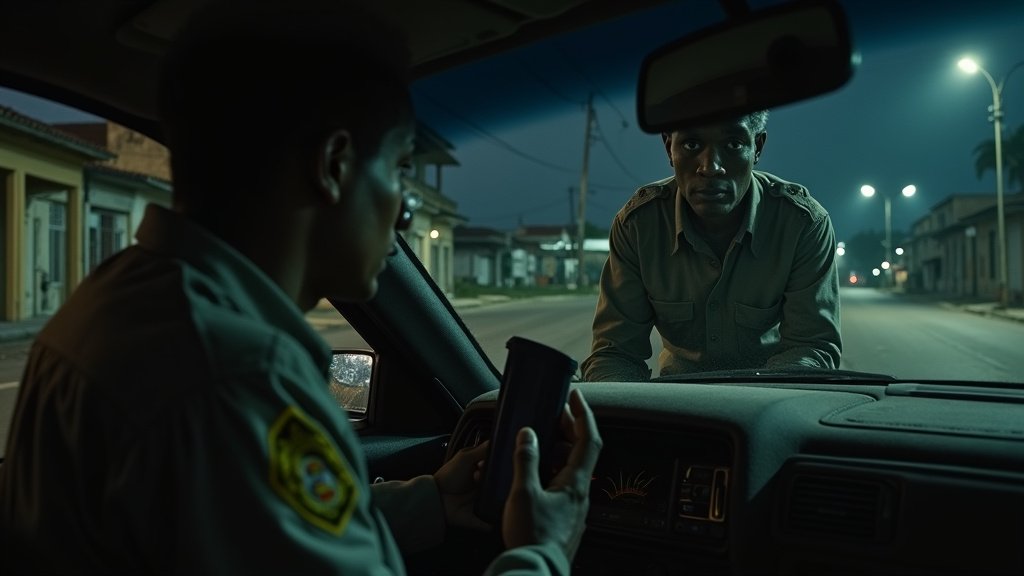KINGSTON, JAMAICA – A viral video capturing a police officer retrieving what appears to be a firearm magazine from the backseat of a vehicle during a search has ignited a fierce debate across Jamaica regarding police accountability and public trust. The incident, swiftly trending online, comes at a critical juncture as the Independent Commission of Investigations (INDECOM) addresses a steady stream of citizen complaints alleging officers planting firearms or related paraphernalia.
Viral Footage Sparks Immediate Public Outcry
The footage, widely shared on social media, depicts a police search of a vehicle. During the operation, an officer is seen removing an item, identified as a potential magazine, from the car’s interior. Shortly after, the same officer returns to the vehicle and retrieves the object, pocketing it without immediate explanation. The occupants of the vehicle are heard expressing alarm, with one individual suggesting that without the recording, the retrieved item could have been used to implicate them. Online discussions quickly gravitated towards theories of evidence tampering or deliberate planting, amplifying public anxieties.
INDECOM Reports Fuel Accountability Debate
This recent viral event echoes and intensifies concerns previously raised by INDECOM. The commission has documented numerous claims from citizens alleging that police officers have planted guns or firearm accessories. These allegations, combined with a high incidence of police-involved fatalities, contribute to a growing chasm of mistrust between the public and the Jamaica Constabulary Force (JCF).
Statistics from INDECOM paint a stark picture. In 2025, the commission has noted a significant uptick in fatal shootings involving security forces, with a particular surge observed during “planned operations.” Alarmingly, INDECOM has frequently reported the absence of body-worn camera footage in many of these critical incidents, complicating thorough investigations and fostering public skepticism.
Body-Worn Cameras: A Persistent Demand
In response to the viral video and the ongoing concerns, advocacy groups and legal experts are reiterating their urgent calls for the widespread adoption and consistent activation of body-worn cameras (BWCs) by police officers. Attorney-at-law and Jamaicans for Justice (JFJ) spokesperson John Clarke emphasized the paramount importance of swift and transparent investigations by INDECOM or internal police probes.
Clarke highlighted that BWCs are indispensable tools that can aid in clearing the names of honest officers while also serving as a mechanism to identify and remove those who may not be serving the community ethically. This perspective is echoed by JFJ, which has a history of campaigning for enhanced police accountability, including a landmark legal victory that mandates investigations into misconduct before officer promotions. Despite these calls, the JCF acknowledges having 750 BWCs in operation with more on order, but admits that a full national rollout is a complex, costly, and time-consuming endeavor. Officials have also noted that BWCs are not always activated during critical incidents, a point of significant concern for INDECOM.
Navigating a Complex Landscape of Security and Rights
The debate over police accountability in Jamaica is situated against a backdrop of significant crime challenges. While the need for effective law enforcement is undeniable, organizations like JFJ and INDECOM argue that progress in human rights and democratic principles is at risk if accountability measures are not robustly implemented. The recurring allegations and the debate surrounding technological aids like BWCs underscore a persistent tension between maintaining public order and safeguarding fundamental rights.
As the investigation into the specific viral incident unfolds, the broader implications for public trust and the future of policing in Jamaica remain a key focus. The path forward hinges on transparent investigative processes, the effective deployment of accountability tools, and a renewed commitment to fostering confidence between law enforcement and the communities they serve. This news continues to be a featured topic of national discussion.





